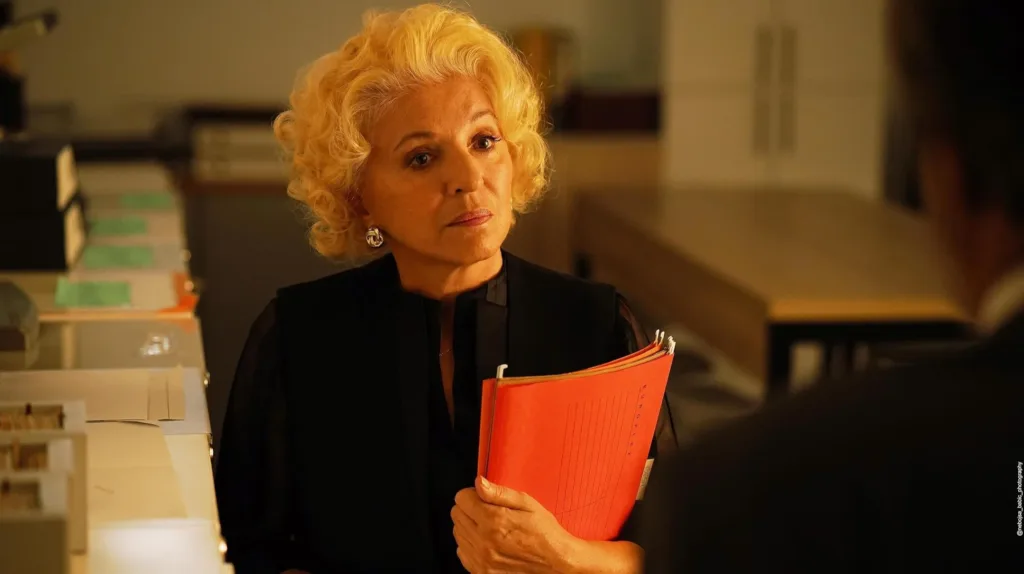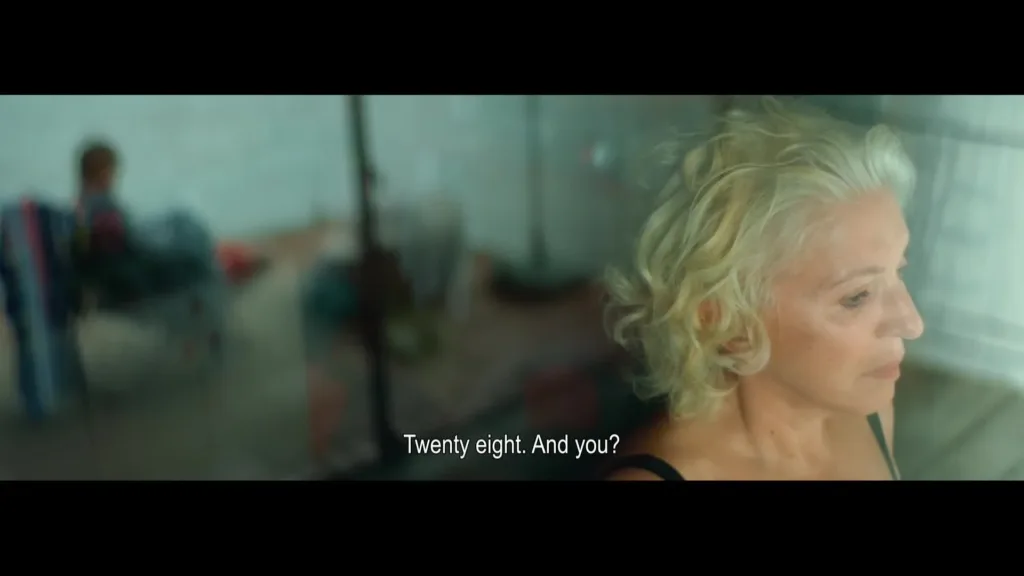The life of Belgrade businesswoman Mara is forever altered by tragedy. Having raised her son Nemanja as a single mother, the two shared an unbreakably close bond. But when a sudden illness cuts that bond far too soon, Mara is thrust into the deeply uncertain territory of learning to carry on without her greatest source of joy and purpose.
Lost in a fog of sorrow, she turns to the one place still under her control—her high-powered career in the cutthroat world of corporate law. There, a chance encounter with a handsome younger client named Milan opens Mara’s eyes to parts of her son’s life kept secret, leading her to question all she thought she knew.
As memories both warm and haunting resurface, Mara’s strictly regulated existence begins to crack at the seams. In the role of a lifetime, actress Mirjana Karanovic guides us with brilliance through the raw, restless process of grieving and finding beyond the depths of even the deepest mourning some small spark with which to light the way forward.
Based on her own script, she crafts a profound character study about motherhood, loss, and reclaiming oneself after having life as you knew it ripped away. Through subtle, soulful performances and intimate direction that lays bare truths we’d rather keep cloaked in darkness, Mother Mara shines a light on recovery’s difficult path and the journeys—both expected and unthinkable—by which healing may come.
The Inner Lives of Mother and Son
Mara built a successful career as a tough corporate lawyer in Belgrade, raising her beloved son Nemanja as a single mother. Though only 21, Nemanja was her entire world. When a sudden illness strikes him down, Mara’s life shatters. She stiffly attends the funeral, ignoring comfort from others in her grief. Returning to work becomes a coping mechanism, the one place she feels control. There, a client named Milan claims knowledge of parts of Nemanja’s secret social life kept hidden from Mara—his passion for fitness and nights out with friends. Milan’s words spark in Mara a desire to better understand the son she lost.
Mara presents a composed façade to the world. Her elegant yet reserved style and sleek modern home radiate control and distance. But past this veneer, private anguish simmers. Memories and dreams haunt her with questions about how well she truly knew Nemanja. As Milan shows care for her pain, Mara reluctantly lets intimacy grow between them, challenging her self-image. His youthful energy lets her feel again, helping uncover repressed thoughts.
Minor characters shine context upon Mara’s journey. Her stern, career-driven personality emerges more through disapproval from family, assuming she needs coddling. Bosses acknowledge work’s importance to her process while concerned for wellbeing. Supporting actors imbue scenes with authentic Belgrade cultural flavor, relationships subtly shaping how Mara redefines what life can offer after unthinkable loss.
The Reshaping of Mara
One of the major themes explored in Mother Mara is processing the immense grief that comes with losing a child. We see Mara experiencing this journey in a heartbreakingly raw way, as fragmented memories and troubled dreams show her emotions processing in a non-linear fashion. Flashbacks also hint at her deep regret that she did not truly know certain parts of her son’s life.
Mara’s grieving process definitely challenges the expectations and traditions typically placed on mothers in her culture. Where she’s meant to cry openly and seek consolation, she instead buries feelings under work and a stern facade. Even initiating a relationship with the younger Milan shakes established norms. Through this character, the film comments on how rigid societal roles can compound personal suffering.
Perhaps most profound is the theme of personal growth emerging through hardship. As Marina allows intimate connections to form again with Milan’s support, we see her transformation from a stoic woman walled off by control to one willing to embrace life’s vulnerabilities. Her grief becomes a catalyst for shaping a truer, freer self—a testament to human resilience.
Mara’s Visual Journey
Mirjana Karanovic’s discrete direction proves masterful at revealing emotional depth through physical cues. Minimizing dialogue, she depends on Mirjana’s naturalistic portrayals—the subtle variations in poise, expressions, and actions that betray Mara’s anguish or flashes of feeling underneath her composed veneer.
Cinematographer Igor Marovic’s camera acts as another instinctive observer. Shots reflect Mara’s mental state, from sterile distant views matching her detachment to increasingly intimate angles coinciding with cracks in her walls. Symbolic framing also emerges, such as the pool glimpsed from her living room—a submerged tension visibly lurking beneath surface serenity.
Complementing this is production design cementing Mara’s controlled environment. Her sleek, austere abode and sharp tailoring reinforce how order defines her. Yet intriguing hints exist of the sensitivity she hides away—Nemanja’s cozy clutter or her looser, relaxed clothing suggesting a softer self locked away. Together, these visual techniques immerse us empathetically in Mara’s interior transformations, revealing how loss warps our relationship with our surroundings until renewal redeems us.
Bringing Mara to Life
Mirjana Karanovic delivers a tour-de-force as the complex Mara. Neither falling victim to sorrow nor appearing cold, she finds profound humanity in between—graceful yet gritty. Subtle gestures speak volumes, from pained smiles acknowledging kindness to releasing suppressed grief in private. Karanovic fearlessly inhabits her character’s rawest moments yet remains empathetic, leading us deftly through Mara’s emotional unraveling.
Co-star Vucic Perovic brings charm and compassion to Milan. His sparks with Karanovic feel authentic, Milan’s care providing solace without attempting to “save” Mara from herself.
Supporting actors flesh out Belgrade with recognizable specificity. Jasna Zalica infuses sisterly concern for Mara’s wellbeing with impatience for her stubborn independence. As Boris, Boris Isakovic brings warmth to his boss role, respecting Mara’s resilience despite grieving “rules.” Together, the ensemble immerses us in Mara’s community, underscoring her journey’s private nature against their rules of ritual and recovery. Karanovic’s superb cast elevates an intimate portrait of transcending loss to profound artistic heights.
Mother Mara Speaks to Festivals and Beyond
Debuting at the prestigious Sarajevo Film Festival, Mother Mara earned rave reviews, which boded well for its festival run. Karanovic’s deeply poignant portrait of grief moved audiences with its nuanced emotional depth. Critics hailed her assured direction and lead performance as Mara, crafting an empathetic yet unflinching window into reconciliation after immeasurable loss.
Such powerful female-led stories remain all too scarce on Serbian screens. But with Mother Mara, Mirjana Karanovic amplifies experiences often relegated to margins. Her directorial work shines an overdue light on the underexplored internal worlds of grieving mothers. Through it, countless souls grieving lost children may find solace in seeing their private struggles dramatized with compassion. And by guiding the film to prizes already at Sundance and Berlin, Karanovic has solidified her place, spearheading more silenced narratives to broader acclaim. Mother Mara leaves an indelible mark, a testimony to both transcending private tragedies and advancing representation that elevates all.
Mother Mara: A Portrait of Persevering Grace
With Mother Mara, Mirjana Karanovic has crafted a profound work of empathetic art. Through her assured direction and compelling lead performance, Karanovic guides viewers on a deeply moving journey inward. We traverse the harrowing terrain of irreparable loss alongside Mara, bearing patient witness as grief’s turmoil gives way to fragile perseverance. Subtle techniques in filming, design, and acting merge to immerse us fully in a woman’s solitary quest to reclaim life from death’s grasp.
Though unflinching in depicting sorrow’s bleakest shores, Karanovic’s film remains a testimony to hope. It reminds us that even mourning’s depths hold seeds of renewal if we allow daybreak in. Simply by facing anguish and continuing on, enhanced awareness and connection can emerge. And for all exposed by crisis, in the quiet acts of letting go and rising anew lies resilience’s grace. In sharing Mara’s story with such care and candor, Karanovic honors countless unsung journeys of healing. Her cinematic accomplishment is a work of empathy that, through purifying what wounds, reaffirms our capacity to overcome all that would undo us—and bring light again.
The Review
Mother Mara
In Mirjana Karanovic's profound and poignant Mother Mara, a gifted artist unveils the private struggles of grief with compassionate authenticity. Through subtle performances and intimate direction, she immerses viewers in one woman's transformation from anguish to fragile perseverance. In sharing Mara's solitary journey, Karanovic pays tribute to resilience's universal spirit. Her empathetic yet unflinching cinematic achievement pierces what isolates and reaffirms our shared humanity.
PROS
- Karanovic's deeply moving lead performance
- Subtle and effective direction conveying grief's complexity
- Evocative characterization of Mara's emotional arc
- Authentic depiction of private mourning experiences
- Thought-provoking exploration of gender roles and cultural expectations
- Impressive technical elements, including production design and cinematography
CONS
- Slightly contrived May-December romantic subplot
- Occasional narrative lulls amid intense emotional scenes
- Minimal character development for supporting roles





















































